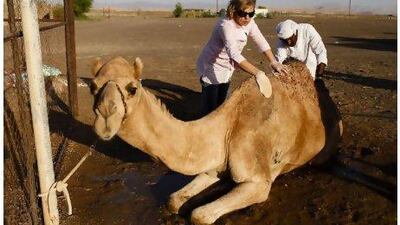AL AIN // If Sarab the camel looks particularly relaxed and content, there's a reason for that.
After a skin cleanse and shampoo with a pine-scented grooming product designed especially for you, what camel wouldn't feel pampered?
"It's a wonderful feeling, they look to you with the long eyelashes," says Birgit Kemphues, the German expatriate businesswoman in Al Ain who created the shampoo and cleanser. "Sometimes they just jump after washing."
Sarab, a retired racing camel, now smells faintly of pine thanks to the extract of German, Russian and Norwegian pine trees used in the grooming product.
"If it's good for humans, why is it not good for camels?" Ms Kemphues says.
"We tried this in an organic way. The camel is an organic thing and it needs organic treatments."
Ms Kemphues was brought up on a farm in north-west Germany but has made Al Ain her second home.
On visits to friends' farms she saw camels were treated with chemicals to cure skin problems or clean their hair.
She sought a solution and paired researchers from UAE University in Al Ain with the University of Applied Science in Osnabruck in Germany to develop a natural shampoo, spray and gel.
It took two years of experimentation with products such as jasmine oil and date extracts before a product was developed using pulp from the core of the pine tree.
"We know that the heart of the pine wood puts all of the sickness and the bad things away from the body," Ms Kemphues says. "It is from experience of the past 1,000 years. It is a kind of protection."
The products are said to reduce harmful bacteria, germs, fungi and parasites.
Beauty supplies have multiplied with the growth of camel beauty contests. A proliferation of shampoos and cosmetics claim to give camels good looks, strong hair and vitality.
"Camels these days are not used like they used to be," said Dr Muhammad Shakeel Ijaz, a vet at the Central Veterinary Hospital in Baniyas. "People are keeping them for beauty and the camels are judged on their beauty so for that reason camels must be groomed properly."
Cosmetic shampoos rid the male camel of pungent, oily secretions on the head that attract females but are less pleasant to humans and competition judges.
Many shampoos do not list their ingredients.
"Camel shampoo smells so chemical," Ms Kemphues said. "It is like when you clean the floor."
Camels may not suffer split ends from blow drying but they do get skin problems such as lice, ticks and mange caused by mites.
Ms Kemphues has folders that document her success stories - balding mounds transformed to soft, downy humps, and so on.
The gel is for insect bites, eczema, wounds and hair loss.
"A lot of girlfriends like to use the camel shampoo," Ms Kemphues said.
A one-litre bottle lasts 40 washes and costs Dh160. Most promotion is done through the majlis.
"People here like to talk," Ms Kemphues said. "They sit in the majlis and talk about the results, so there is no need to make advertising for something like this."
Sultan Al Ketbi, an owner who regularly spends Dh3,000 on his camels for beauty contests, has started to use the shampoo once a week.
"She's not from Germany, she started to be one of the family and learn our traditions," said Mr Al Ketbi. "She brought us all these things, she's helping us. I see the benefits."
For Ms Kemphues, success is in the eyes of the camel.
"When I see a happy animal I get a motivation to do more. Some people who have children say that when a child looks in your eyes you feel happy. It is like this for camels also.
"It is amazing when you think about what camels can do. We had only camels and dates here and they made this country develop. When I do this I feel like I do a good thing for this country."

